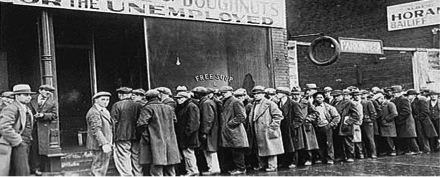
Employability can be defined as: ‘a set of achievements –skills, understandings and personal attributes –that make graduates more likely to gain employment and be successful in their chosen occupations, which benefits themselves, the workforce, the community and the economy"
–Professor Mantz Yorke (2004) 'Employability in Higher Education: what it is - what it is not', Higher Education Academy/ESECT
Employability is an issue that concerns everyone interested in the workforce today, but not in the same way. It sometimes depends on background, family situation, sometimes even on origin or gender. However, it most often seems to depend on age. Do we face the same issues at the age of 25 as at the age of 40? Clearly not. And what happens when we reach 50 years of age? Taking a look at the perspective of a 30-something year old versus someone in their 50s, we see that there are differences and similarities which clearly what being employed means to someone in either of these situations, as well as how employment has an influence on your life in general.
30 years old and...?

You are in your 30’s. What is expected of you? Most likely, you have completed your education and you have had your first work experience. Some will have close to 10 years of experience, some just a few, with a few years of travel or time off for family. Most have moved out of their parents’ home and are independent. Your private life is probably stable, and of course everyone is professionally active. There is no room for a mid-life crisis that can be forgiven a 40-something. Neither is it really time to study, as you are getting too ‘old’ for it by now.
You are at the peak of your abilities, and you simply should be working. Your employability is supposedly very high. Society tends to perceive people in this age group who are unemployed as having some type of professional problem. This does not include those who do not need to work because of family wealth or dedicate their time to raising children. When networking or simply meeting new people, saying you are ‘‘in between jobs’’ automatically puts you in a social box marked “unusual’’. At this age, social image is largely viewed through the prism of where you work, what you do and in which position. As a part of the Facebook and Twitter generation, you are at ease with social media, familiar with popular culture, and you know that image is very important. After all, your adult life falls in the 21st century –the age of technology, media, and pop culture.

Furthermore, whether voluntarily or by choice, part of who you are is where you work. Many people identify themselves with the company where they are employed, whether it is an image of the company (big and reliable, stable, with traditions, family run…) or with a company’s product. A banker is usually identified as being discreet and reliable; a salsa instructor is perceived as someone who is much more fun and easygoing. The social image of someone working for Bacardi or Philip Morris, for example, is more often influenced by the product his or her company sells. An employee in an NGO, on the other hand, “should be” kind, understanding and altruistic. Hospital employees, social workers, teachers, musicians…we all have an image in our mind of the sort of person who would be employed as one of the above. The problem arises when you do not fit into one of these categories: when you are unemployed. At the age of 30, a big part of your identity is missing for society to “read” you correctly. There is a lot of pressure to get back on the market, not to allow “holes’’ in your CV and to keep working. Being unemployed automatically puts you in a group where you cannot be categorized. To some, that might not be such a bad thing. To others, it is a great source of stress which could lead to serious health and social problems.
50 years old and...?

You are 50. At half of a century old, you command a certain amount of respect. You have a lot of experience. Your expectations and those of your employer are probably high. Contrary to younger people, you may feel that you cannot easily satisfy a potential employer with certificates and diplomas since they could be perceived as being obsolete. At this stage, it can become more difficult to convince your future employer that you are the ideal person for the job. This includes proving that your education level is as good as (or even better than) a younger person’s. You may have a lot more life experience and have faced a lot of good and bad situations, however, that might mean you also have a higher price tag.
At 50+ years of age, you are definitely still employable. If you are able to stay in the same company for years, you can evolve with it, its culture and its technologies. You are considered as part of it, and as a valuable source of information and best practices. It is normal that you share your experience with your colleagues. You are treated with respect as a “veteran’’ of the company, and you are less likely to suffer from age discrimination. By now, your employability is based on your experience and your adaptability to the ever-changing working environment, new technologies and media. Most 50-somethings remember when personal computers were just becoming popular, and have lived through the period when they were something nice to have, when people did not really know the potential of these new tools. Once user-friendly software was developed, the IT age began. Now, we can no longer imagine a world without electronic instruments accessible to all ages.

With your experience, however, there may be more pressure to show that you still have relevant skills. If you suddenly find yourself unemployed, you need to be fully aware of the market situation and its needs in order to find out where your skills need to be updated and how to improve them. Only once you have completed this step can you develop a winning strategy and properly showcase your experience.
And then, there is social media. Some 50-somethings may not realize the importance of an “online profile” in the working world. That is not to say that people in this age group do not have Facebook or Twitter accounts, but they may use them in different ways. One reason may be that communication to a 50-year-old may be more of an exchange, a two way process. At the same time, by embracing social media as enthusiastically as younger generations do in the form of a ‘window’ through which others can see them, broadcasting messages and not necessarily expecting feedback from their audience, they can get exactly the same benefits. Years ago, you would pay more attention to your physical appearance, CV, and penmanship. Today, showing that you are a professional often involves highlighting skills and knowledge on platforms such as LinkedIn, and paying attention to how you appear on social media.
Regardless of age…
Regardless of age, our personal branding is impacted by what we do for a living as well as where we work. Looking at the above two perspectives, we can see the extent to which our professional lives influence our image. Furthermore, we understand how the need to remain employable can both influence how, and be influenced by how, we project the image of ourselves towards others in person and through social media.
Wherever you are in your career, your personal image will always be impacted by your work situation. In this series of articles on personal branding (“image de soi” in French), we will focus on the importance of personal branding at the very beginning of our professional careers, all the way through to the very end of our professional activity: personal branding for people over 60.
Aleksandra Piecuch & Romeo Lancellotti
Sources & interesting articles:
http://www.employability.ed.ac.uk/documents/Staff/HEA-Employability_in_HE%28Is,IsNot%29.pdf
http://www.employability.ed.ac.uk/What/
http://www.annetdelange.nl/data/_uploaded/image/annet/Beateco.pdf
http://www.ncbi.nlm.nih.gov/pmc/articles/PMC2031143/
http://www.unece.org/fileadmin/DAM/pau/_docs/age/2011/Policy-briefs/9-Policy-Brief-Age-Friendly-Employment.pdf
http://www.onrec.com/news/economy/britain-will-pay-for-many-decades-unless-our-youth-unemployment-problem-is-solved-warns
http://www.blogging4jobs.com/life-2/the-reality-of-being-too-old-and-unemployed/#OmMi34hY8Byx79IG.97
Photo sources :
http://www.kettlemag.co.uk/article/my-job-centre-plus-misery-its-just-not-working
http://www.everystockphoto.com/photo.php?imageId=877510
http://www.everystockphoto.com/photo.php?imageId=17857559
http://www.everystockphoto.com/photo.php?imageId=1478503
https://www.flickr.com/photos/mytudut/5188623761









